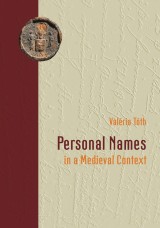Details

Personal Names in a Medieval Context
Unverändertes eBook der 1. Auflage von 2022
|
CHF 29.00 |
|
| Verlag: | Helmut Buske Verlag |
| Format: | |
| Veröffentl.: | 17.11.2022 |
| ISBN/EAN: | 9783967692723 |
| Sprache: | englisch |
| Anzahl Seiten: | 237 |
Dieses eBook enthält ein Wasserzeichen.
Beschreibungen
The book studies general name theoretical questions and universal features of personal name giving and also provides a description of the personal name system of the medieval Kingdom of Hungary. The chapters on name theory introduce a cognitive-pragmatic model that is suitable for the characterization of the anthroponym system of any language in any of its historical eras. In the chapters discussing the features of old Hungarian personal name giving and usage we can find a specific application of the theoretical model. The medieval Carpathian Basin provides an excellent opportunity for such an analysis for several reasons. On the one hand because this region was at the crossroads of languages and cultures in the Middle Ages and this also clearly influenced its anthroponym systems. On the other hand, the time period under scrutiny, the Middle Ages (and more precisely the Old Hungarian Era between 895 and 1526) witnessed the restructuring of the name system on multiple levels, including the appearance and ensuing dominance of personal names of a Latin origin as a result of the country becoming a Christian nation and the emergence of family names as a new personal name category. The book also provides a detailed overview of the historical process in which personal name categories and personal name types were built and relied on one another.
Dieses Buch behandelt einerseits allgemeine namenstheoretische Fragen und universelle Charakteristika der Personennamengebung und Personennamenverwendung, andererseits bietet es eine Beschreibung des Personennamensystems des Ungarischen Königreichs im Mittelalter. In den namenstheoretischen Kapiteln wird ein kognitiv-pragmatisches Beschreibungsmodell vorgestellt, das für die Darstellung des Personennamensystems jedweder Sprache in all ihrer Epochen geeignet ist. In den weiteren Kapiteln zu den Besonderheiten der alten ungarischen Personennamengebung und Personennamenverwendung ist die konkrete Anwendung des Beschreibungsmodells zu finden. Das mittelalterliche Karpatenbecken bietet für eine solche Analyse ein ausgezeichnetes Untersuchungsfeld. Zum einen galt diese Region als Sammelstelle von Sprachen und Kulturen im Mittelalter, was natürlich auch in den Personennamensystemen seine Spur hinterlassen hat, zum anderen ist die untersuchte Epoche, das Mittelalter (genauer die sogenannte altungarische Zeit, 895–1526) als das Zeitalter zu betrachten, in dem die Restrukturierung des Namensystems auf mehreren Ebenen zu sehen ist: Die Erscheinung und das rasche Dominantwerden der Personennamen lateinischen Ursprungs als Ergebnis der Einbindung in den christlichen Kulturkreis ist als einer dieser Prozesse anzusehen, während die andere große Veränderung die Entstehung der Familiennamen als neuer Personennamentyp darstellt. Im Buch wird auch der historische Prozess der Aufeinanderschichtung der Personennamenkategorien und Personennamentypen detailliert vorgestellt.
Dieses Buch behandelt einerseits allgemeine namenstheoretische Fragen und universelle Charakteristika der Personennamengebung und Personennamenverwendung, andererseits bietet es eine Beschreibung des Personennamensystems des Ungarischen Königreichs im Mittelalter. In den namenstheoretischen Kapiteln wird ein kognitiv-pragmatisches Beschreibungsmodell vorgestellt, das für die Darstellung des Personennamensystems jedweder Sprache in all ihrer Epochen geeignet ist. In den weiteren Kapiteln zu den Besonderheiten der alten ungarischen Personennamengebung und Personennamenverwendung ist die konkrete Anwendung des Beschreibungsmodells zu finden. Das mittelalterliche Karpatenbecken bietet für eine solche Analyse ein ausgezeichnetes Untersuchungsfeld. Zum einen galt diese Region als Sammelstelle von Sprachen und Kulturen im Mittelalter, was natürlich auch in den Personennamensystemen seine Spur hinterlassen hat, zum anderen ist die untersuchte Epoche, das Mittelalter (genauer die sogenannte altungarische Zeit, 895–1526) als das Zeitalter zu betrachten, in dem die Restrukturierung des Namensystems auf mehreren Ebenen zu sehen ist: Die Erscheinung und das rasche Dominantwerden der Personennamen lateinischen Ursprungs als Ergebnis der Einbindung in den christlichen Kulturkreis ist als einer dieser Prozesse anzusehen, während die andere große Veränderung die Entstehung der Familiennamen als neuer Personennamentyp darstellt. Im Buch wird auch der historische Prozess der Aufeinanderschichtung der Personennamenkategorien und Personennamentypen detailliert vorgestellt.
Valéria Tóth is university professor and head of the Doctoral School of Lin-guistics at the University of Debrecen, Hungary with numerous students supervised by her working in the field of onomastics. She is the editor of several journals and the head of various Hungarian and international scholar-ly research projects.
Diese Produkte könnten Sie auch interessieren:

Language Policy and Modernity in Southeast Asia

von: Antonio L. Rappa, Lionel Wee Hock An

CHF 118.00















